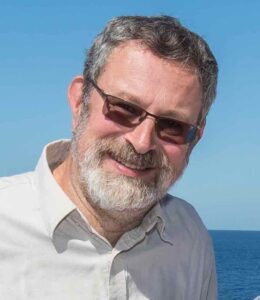Andreas Teske
University of North Carolina at Chapel Hill
2022-2023 Distinguished Lecturer
From magma to microbe: The deep hot biosphere of Guaymas Basin
The Guaymas Basin in the Gulf of California is a young marginal rift basin characterized by active seafloor spreading and hydrothermal venting. High plankton production in surface waters and terrigenous sedimentation from the Sonoran mainland combine to rapidly deposit organic‐rich sediments, which are permeated by extensive thermal and geochemical gradients. Deeply emplaced hot volcanic sills extend across the basin and alter the surrounding sediments by transforming buried sedimentary carbon into hydrocarbons, especially methane. The rapid mobilization and re-injection of these hydrocarbons into the biosphere impact the carbon cycle of the basin and provide a model system that illuminates climate perturbations. Subsurface microbial populations potentially intercept and process these hydrothermally generated and mobilized carbon sources, but their depth extent and cell numbers are expected to be controlled by the steep geothermal gradients that are characteristic of Guaymas Basin. Here I will provide an overview on this fascinating hydrothermal geo-ecosystem, and introduce IODP drilling expedition 385 to Guaymas Basin (Sept. 16 to Nov. 16, 2019) with JOIDES Resolution. The expedition scientists and drilling crew recovered 4 km of sediment core and >350 m of sill core from eight drilling sites across Guaymas Basin, measured geothermal gradients in diverse settings ranging from recently emplaced hot sills to cold seep sites, and probed the highly diverse biogeochemistry and microbiology of the Guaymas Basin subsurface sills and sediments. Naturally I am not entirely unbiased, but the expedition has come upon many surprising and unexpected findings that will sustain many years of follow-up research. Highlights will be presented as appropriate for ongoing investigations.
Dr. Teske is a professor in the Department of Marine Sciences at the University of North Carolina at Chapel Hill. His expertise is in microbial ecology and microbial systematics. He is particularly interested in bacteria and archaea of marine environments, like the hydrocarbon-rich Guaymas Basin in the Gulf of California. More specifically, he focuses on understanding the natural diversity of the indigenous microbial communities as well as their environmental tolerances and physiological adaptations. He has been working for many years in a part of the ocean that is involved in the rapid microbial and abiotic hydrocarbon production and consumption. His integrated biogeochemical and microbiological research approach to science explores the pathways of and environmental controls on consumption and production of methane, other alkanes, dissolved inorganic carbon, low molecular weight organic acids and sedimentary organic matter that fuel the Guaymas Basin microbial ecosystem. Dr. Teske has led multiple expeditions with research ship Atlantis and deep-sea submersible Alvin to Guaymas Basin; his most recent project is deep subsurface drilling across this spreading center. He serves on the editorial advisory board of Geobiology, and is chief specialty editor for Extreme Microbiology in Frontiers of Microbiology.
LECTURE SCHEDULE
- January 27, 2023 – The University of Iowa, Iowa City, IA
- February 10, 2023 – University of California Santa Cruz, Santa Cruz, CA
- March 16, 2023 – Louisiana State University at Lafayette, Lafayette, LA
- October 4, 2023 – University of Colorado Boulder, Boulder, CO







